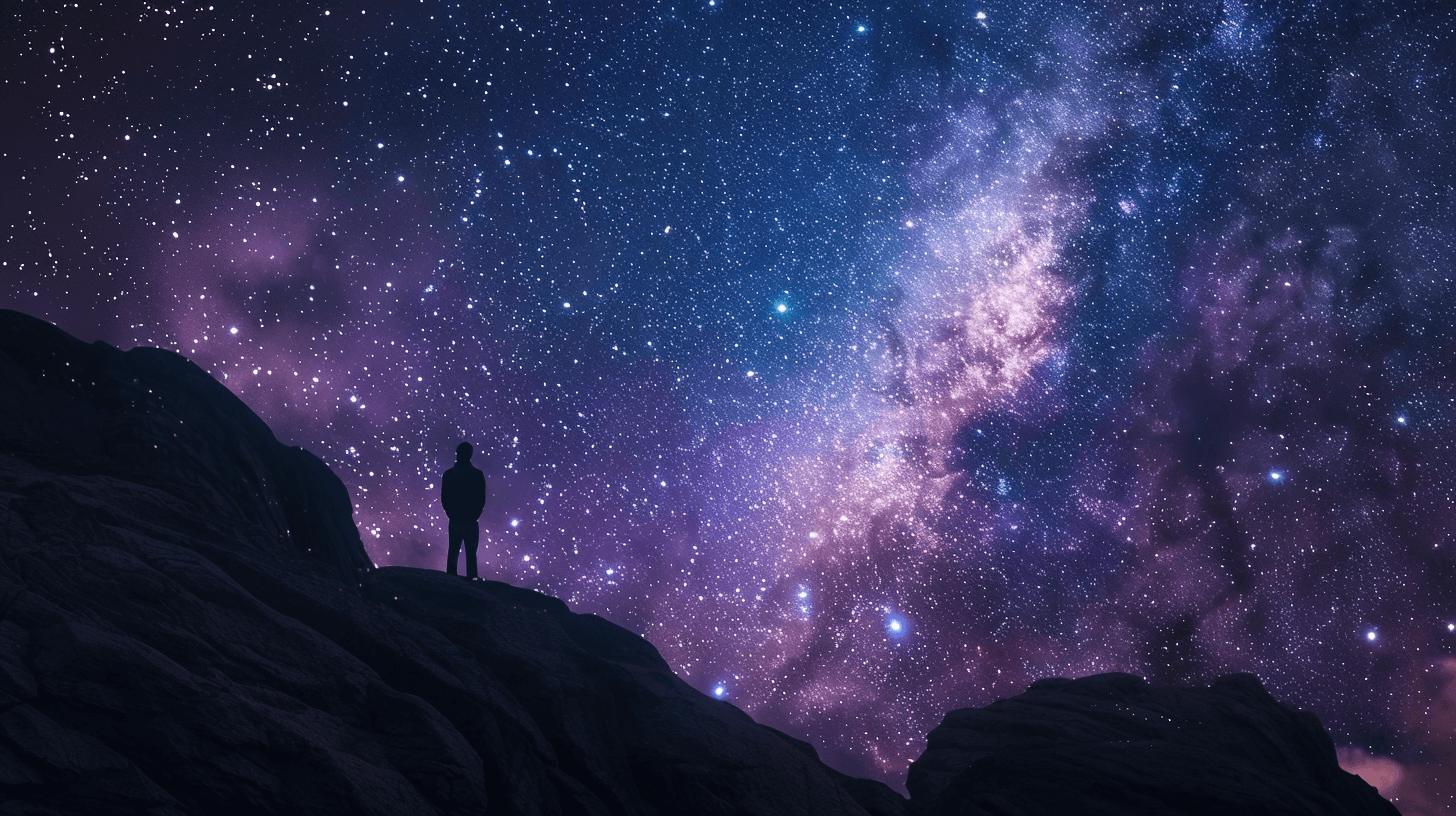Introduction

There is a mystery as ancient as existence itself, one that has captivated the hearts and minds of humanity for millennia. We gaze at the stars, peer into the depths of space, and marvel at the vastness of the cosmos, all the while asking the most profound questions of our existence: What is the universe? What is consciousness? And how do they relate to one another?
For centuries, science and spirituality have offered seemingly different answers to these questions. Science, with its analytical precision, has shown us the mechanics of the universe—its laws, its particles, its vast structure. Spirituality, with its intuitive depth, has led us to explore consciousness—the essence of being, the awareness through which all things are perceived. But as we stand on the precipice of a new paradigm, we begin to see that these two paths are not divergent after all. In fact, the closer we examine both, the more we realize that the universe and consciousness are not separate entities. They are, in essence, one and the same.
The universe, as we know it, is not a random collection of matter and energy existing in isolation. It is a manifestation of consciousness, the infinite, boundless awareness that permeates every corner of existence. The idea that the universe is a physical machine running on deterministic laws is giving way to a far more profound truth: the universe is consciousness in disguise. To know the universe is to know oneself, and to know oneself is to awaken to the cosmic consciousness that we are all an inseparable part of.
Consciousness: The Ground of Being
Before we delve into the connection between the universe and consciousness, we must first explore what consciousness truly is. For many, consciousness is seen as a product of the brain—a byproduct of neural activity that arises in living organisms. But this materialist view of consciousness is increasingly being challenged by both scientific inquiry and spiritual insight. Consciousness is not an emergent property of matter; it is the fundamental ground of being.
In the non-dual traditions of the East, particularly Advaita Vedanta and Buddhism, consciousness is described as the substratum of all experience. It is not something we have, but something we are. It is the eternal, unchanging awareness in which all perceptions, thoughts, and sensations arise. This consciousness is not limited to individual minds but is universal, boundless, and infinite. It is the source from which all phenomena—whether mental, physical, or emotional—emerge.
Science, too, is beginning to catch glimpses of this deeper truth. In quantum physics, the observer effect demonstrates that consciousness plays a crucial role in shaping reality. At the quantum level, particles do not exist in fixed states until they are observed, implying that consciousness and matter are deeply intertwined. This challenges the classical notion that the universe exists independently of our observation. Instead, it suggests that the universe and consciousness are not separate; they are two aspects of the same reality.
The Universe as a Mirror of Consciousness
The most groundbreaking realization that emerges from this understanding is that the universe itself is conscious. The stars, the galaxies, the vastness of space—all of it is a manifestation of the same consciousness that resides within us. The universe is not an external object to be observed from afar; it is a reflection of the cosmic mind, of the cosmic self.
This is where science and spirituality converge in a profound way. Cosmology, the scientific study of the universe’s origins and structure, has revealed that the universe operates according to incredibly precise laws, with fine-tuned constants that allow for the emergence of life and consciousness. These observations lead us to question whether the universe could be purely random, or whether it is the expression of a deeper intelligence—a universal mind that is self-aware.
In spiritual traditions, this universal mind has been called by many names: Brahman, the Tao, or the Infinite. It is the source from which all creation springs and into which all things will eventually dissolve. The universe, then, is not a dead, mechanical construct but a living organism—an expression of cosmic consciousness unfolding through space and time. Every star, every atom, every quantum fluctuation is an expression of this cosmic self.
The Illusion of Separation
One of the greatest illusions that the collective human consciousness has accepted is the idea of separation—the belief that we are distinct, isolated beings existing in a universe that is external to us. This illusion is the product of the egoic mind, which creates a sense of selfhood by drawing boundaries between “self” and “other,” “subject” and “object.”
But this separation is illusory. As both quantum physics and spirituality reveal, the boundary between the observer and the observed dissolves when we look closely enough. In the quantum realm, particles that appear separate are in fact entangled—influencing each other instantaneously, even across vast distances. This interconnectedness points to the underlying unity of all things.
Spiritual teachings have long echoed this truth. The non-dual traditions teach that the self we perceive as separate is an illusion, a construct of the mind. In reality, there is no separation between the self and the universe, between the individual and the cosmic. The Atman—the individual self—and the Brahman—the cosmic self—are one and the same.
When we transcend the illusion of separation, we experience the oneness of existence. This is the essence of enlightenment: the recognition that the universe is not something we live in, but something we are. To be enlightened is to awaken to the cosmic self—the awareness that the universe is not outside of us, but is us.
The Cosmic Dance: Creation and Dissolution
If the universe is consciousness in disguise, then creation itself can be understood as a cosmic dance—a dance of form and formlessness, of manifestation and dissolution. The universe, like consciousness, is cyclical in nature. It arises, expresses itself, and eventually returns to its source.
In Hindu cosmology, this is expressed through the concept of the cosmic cycles of creation, preservation, and dissolution—Brahma, Vishnu, and Shiva. The universe is born, it evolves, and eventually it dissolves back into the infinite. This cycle mirrors the cycles of consciousness within each of us—birth, growth, death, and rebirth.
Quantum physics also points to this cyclical nature. At the quantum level, particles arise from the quantum field, momentarily take form, and then dissolve back into the field of potential. The Big Bang, which gave birth to the universe, is not a singular event but part of a larger, infinite cycle of creation and dissolution.
To understand the cosmic self is to recognize that we are part of this dance. Our individual lives are expressions of the cosmic consciousness, temporarily taking form before dissolving back into the infinite. The same intelligence that gave birth to the stars is the intelligence that breathes through us. In this way, life and death are not opposites but complementary aspects of the same process—the eternal unfolding of consciousness.
Awakening to the Cosmic Self
To awaken to the cosmic self is to experience a profound shift in consciousness. It is the realization that we are not separate beings living in an indifferent universe, but expressions of the universe itself—consciousness exploring itself through form. This realization transforms not only our understanding of reality but our relationship to life.
When we awaken to the cosmic self, we see the interconnectedness of all things. We understand that the suffering of others is our own suffering, that the joy of others is our own joy. The boundaries between self and other dissolve, and we experience life as a unified whole. This is the state of non-dual awareness, where the distinction between subject and object, self and universe, vanishes.
In this state, we no longer see the universe as a cold, mechanical system governed by random chance. We see it as a living, breathing organism—an expression of the same consciousness that animates our own lives. We understand that the universe is not just a backdrop for our existence but is alive with awareness, intelligence, and purpose.
The Future of Human Consciousness
The realization that the universe is consciousness in disguise has profound implications for the future of human consciousness. As more individuals awaken to this truth, we will experience a collective shift in how we understand ourselves and our place in the cosmos. The divisions that have defined humanity—national, religious, racial—will begin to dissolve as we recognize our shared identity as expressions of the cosmic self.
This awakening will lead to a new era of global enlightenment, where we move beyond the egoic mind and embrace the unity of existence. We will come to see that the problems that plague humanity—war, poverty, environmental destruction—are the result of the illusion of separation. By transcending this illusion, we will create a world that reflects the harmony and balance of the universe itself.
The journey to awakening the cosmic self is not a distant goal; it is available to each of us in this very moment. All that is required is a shift in perspective—a willingness to look beyond the surface of reality and see the consciousness that lies beneath. When we do, we will realize that the universe is not something we are separate from, but something we are. This is the truth of the cosmic self, and it is the key to both individual and collective enlightenment.
Conclusion: The Universe as Consciousness
The idea that the universe is consciousness in disguise is not just a philosophical concept; it is the deepest truth of our existence. It is the recognition that the universe is not a random, mechanical construct, but a living, intelligent being—one that expresses itself through us, through every star, every atom, and every breath we take.
When we awaken to this truth, we transcend the illusion of separation and step into the oneness of existence. We realize that the universe is not outside of us, but within us. We are the universe, conscious of itself.
In this realization, we find the ultimate truth: that the cosmic self is who we have always been, and the universe has been waiting for us to remember.

Feel your suffering within. I teach seekers of self a clear path toward enlightenment.
Phillip Lew helps you achieve a clear path to enlightenment, guiding you to uncover your true self. Explore his journey and transform your life with his book, Feel Your Suffering Within. With a profound understanding of human existence, Phillip’s mission is to lead others towards awakening and authentic living.








